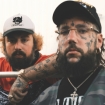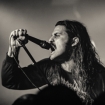"There were two things in my early life that made me feel OK. The first one was hearing Black Sabbath for the first time. The second one was getting drunk the first time. And I remember both of those things vividly to this day," Spirit Adrift main man Nate Garrett says, looking back. "Fast-forward, one of those things very nearly fucking killed me, and one of them didn't. So I just kind of stuck with the one that didn't, you know?"
Black Sabbath sent Garrett down the heavy-metal rabbit hole as a 12-year-old outsider growing up in Bartlesville, Oklahoma; he started drinking at around the same age, and for a long time, heavy music and alcohol went hand in hand for him. Now sober, he plays in not one but two highly touted metal bands, both with his friend Chase Mason: gnarly death dealers Gatecreeper, and his own personal passion project, introspective doomsayers Spirit Adrift, whose 2017 album, Curse of Conception, appeared on numerous best-of-the-year lists. It's an unlikely landing point for someone who was born to two deaf parents — a fact that Garrett even finds "pretty strange" in retrospect, "that I would be obsessed with sound and music and stuff," he reflects. But it's not really any more unlikely than the fact that he's alive today at all, having hit rock bottom in 2015 after 10 years of drinking every day until he weighed only 140 pounds, wasn't eating and, in many ways, wanted to die.
In March of that year he went through detox, and that same month, out of his newfound sobriety emerged Spirit Adrift — specifically, two songs, "Specter of Ruin" and "Perpetual Passage," that he initially wrote only for himself, but eventually ended up on the project's 2016 debut EP, Behind - Beyond. From its beginning as a solo project to the full-fledged band it is now, Spirit Adrift has represented an intensely personal outlet.
"There's some shit with this band that I hadn't really talked about publicly, that's kind of personal shit," Garrett said before generously giving us his most revealing interview to date, "but I think that it needs to be known in order for people to really appreciate what the band means."
YOU LIVE IN ARIZONA NOW, BUT GREW UP IN OKLAHOMA. WHAT WAS YOUR UPBRINGING LIKE?
NATE GARRETT I had kind of an untraditional upbringing … both of my parents were deaf, actually. My mom passed away when I was, like, four months old. That was a lot for my dad to handle, being disabled and then having a kid and then losing his wife. So my dad's parents pretty much raised me. My dad was always in my life, but there was a lot of other tragedies in my family when I was young. Out of respect to everybody in my family, I'll just leave that at that. But I kinda felt off like my whole life. I just didn't, didn't really feel right. I didn't really fit in.
I think there's a lot of people that feel that way. I know that's a big trait of, quote, unquote, "alcoholics" that you come to find out later, when you get in recovery stuff. I didn't really have any frame of reference for what was "cool," with my dad being disabled and being raised by my grandparents. They're all some of the best, strongest, most amazing people I've ever met. But as far as being able to fit in with kids my own age, I didn't really have a frame of reference, you know?
AND THEN YOU FOUND HEAVY METAL …
It was just blind luck or fate or something that I was watching VH1 and they were doing a pop up video for Black Sabbath's "Paranoid." It was like I got blasted in the face with cosmic rays at 12 years old. I just remember, like, freaking the fuck out. I went to the mall and bought Paranoid, Sabbath Bloody Sabbath and the self-titled album all on the same day. I was obsessed. I mean, I have an obsessive personality, which is another trait that goes with addicts, you know?
SO WHEN DID YOU START DRINKING?
I started drinking in middle school around the same time as hearing Black Sabbath for the first time. I started drinking by myself at my house, like, I would sneak liquor out of the liquor cabinet and just try it in the middle of the night, you know? So very much just like a curiosity-slash–adrenaline-junkie kind of thing. I did that for a while, and then I come to find out there were some kids in my neighborhood that were the same age as me that were also fucking around with booze. So we linked up and would, like, drink and shit. But middle school for me was really tough. I got bullied. Like I was saying earlier, just not having a frame of reference for what was cool, you know what I mean? And even after discovering heavy metal — heavy metal wasn't fucking cool to people in Oklahoma. I would wear a Black Sabbath shirt to school and they're like, "What the fuck is this shit? What's wrong with this fool?" I was trying to grow my hair out. I got picked on until I beat the shit out of this kid and then things got a lot easier after that.

DID YOUR LOVE FOR HEAVY METAL AND DRINKING KIND OF GO HAND IN HAND?
Yeah. At the time, it all fed into itself, just the disdain for the society that we were in, the disdain for how boring we thought everybody was. You know, I grew up in a small town in Oklahoma. Everybody was fucking Christian and conservative and weird and fucking repressed. For whatever reason, I wasn't like that ever. All of those things: the drinking, the partying, the skipping school, the playing music, the obsession with the Pantera home videos, it was all just coping mechanisms and rebellion to deal with the environment we were in.
PLAYING MUSIC QUICKLY BECAME A CRUCIAL OUTLET FOR YOU AS A CHILD.
I took piano and guitar lessons when I was young. Eventually, I made a couple of friends in seventh or eighth grade and we started playing — not having any frame of reference, just whatever we wanted to. Age 12 or 13, I started playing in bands, and I haven't really stopped for any extended period of time since then, and I just turned 30, so 17 years I've been playing in bands.
WHEN DID YOU DECIDE TO JUMP HEADFIRST INTO THE LIFE OF A MUSICIAN?
I was good in school, and eventually moved to Arkansas in 2006 to attend business school where I was in the honors program within the first semester. Soon thereafter, I went to a house show that changed everything. There were two bands playing: one was a sludgy doom-style band and the other was crossover thrash. I just couldn't believe that there were two bands that good in Fayetteville, Arkansas. I eventually formed Queen Beast with members of each band — my first real band. Through that, I met the dudes in Deadbird, Rwake, all kinds of good bands in Arkansas. I met the Pallbearer dudes before Pallbearer even existed, and just kind of learned from those guys.
HOW HAS YOUR FRIENDSHIP WITH PALLBEARER CHANGE YOUR WORLD VIEW AS A MUSICIAN?
I drove and did merch on many of their early tours. It has been an honor to see them grow firsthand and I've never been anything but overjoyed for them. None of us really had shit going on — we were just friends. They've worked for it and I knew beyond a shadow of a doubt had earned it and deserved it. I was just like whatever they want me to do, I'm down a hundred percent.
THIS ENTIRE TIME YOU WERE DRINKING AND PARTYING. WHEN DID YOU REALIZE IT HAD BECOME A PROBLEM?
My dad and stepmom moved out to Arizona and some shit went down with them that was very upsetting and I was kind of thrust in the middle of it. And I think that's when my drinking turned into something a lot darker. In hindsight, I think I was trying to kill myself. I didn't want to upset people that love me, but I also wanted to die. I was drinking a fucking liter of Wild Turkey 101 every day minimum and I wasn't eating and that went on for about three years.
DID YOU HAVE A SPECIFIC TURNING POINT? SOUNDS?
It all came to a head around my 27th birthday when I flew to Arkansas to stay with a close friend. I was really a mess, and my close friend, who was a chef, kept trying to feed me and all I wanted to do was drink. Eventually we got drunk together and he got the courage to lay it down to me: "You gotta stop drinking." I thought, if he's telling me to stop, this is serious. So I got on the plane to go back to Arizona on my actual birthday with all these dark thoughts — thoughts about how little I'd accomplished with my life and "the 27 club" — drinking on the plane while still hungover drunk. I got home and my girlfriend, who's my wife now, picked me up and said, "You don't even smell like whiskey. You smell like death." I took a second and didn't get mad. I knew she was right. I just said, "Take my ass to detox. I'm done with this shit." Two days after that I was in detox.
AFTER RETURNING FROM DETOX, YOU CHANNELED YOUR FIGHT INTO SPIRIT ADRIFT. WHY WAS MAKING THIS A SOLO PROJECT SO IMPORTANT TO YOU?
After detox, I started to get my mind and body to work again and pretty much immediately wrote the first two Spirit Adrift songs. And I didn't tell anybody about it. I was really sick of every band that I was a part of falling apart and never hitting the levels that I wanted to hit. So I created this band for me, and it won't be able to fall apart because I won't even let it be a band. I'm not going to play it for anybody. Fuck that. I just need these songs for me. The name reflects my personal feeling on where I was, and I wanted to stay true to that. This was about me and for me. I had never done anything where I was writing everything and performing everything all by myself.
WITH THE SUCCESS OF CURSE OF CONCEPTION, YOU HAVE BEEN TOURING SIGNIFICANTLY, JOINED BY CHASE FROM GATECREEPER AND JEFF OWENS AND MARCUS BRYANT FROM GOYA. HOW HAS THAT CHANGED THE DYNAMIC OF THIS VERY PERSONAL PROJECT?
The most significant change that has occurred happened to me personally, in that it has restored my trust in working with other people. I'm making this music because I have to — I use it to channel things from my past and things even today that go on in my personal life. I think I've finally found a group of people that feel the same way and need to make music as much as I need to.












